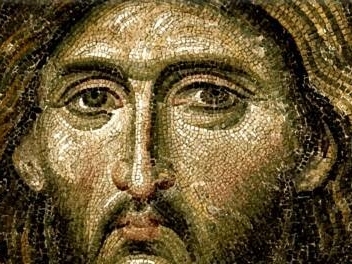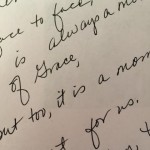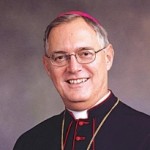Given the burlap banners, the lack of kneelers (because heaven forbid we kneel before Christ in worship and adoration, particularly after Communion) the ridiculously pretentious (and dubiously licit) whole-wheat pitas and everything else Katrina Fernandez describes here, I would already be pre-disposed toward wanting to avoid the parish from which her grandmother was laid to rest, but this bit is really unconscionable, unpastoral, and in need of attention:
Not only did he consecrate a wheat pita but when I went up to receive on the tongue he forcefully tried to pry open my hands to put the Eucharist in my palm. When I remained in front of him with my mouth open, holds folded closed, to receive on the tongue he grabbed my hand and took the Body of Christ, wedged it between my fingers and said, “Just take it. It’s easier this way.”
Easier for what or whom?! There were not even 50 people in that church! How was me receiving on the tongue going to disrupt the communion line? It made absolutely no sense. Just take it, it’s easier this way? And at my grandmother’s funeral is where you decide to make your little anti-trad point?
And while he was busy making a show out of denying me communion on the tongue in front of my family at my dead grandmother’s funeral, he was hap-happily giving out consecrated wheat pita to the rest of my non-Catholic family without a moment of instruction or notice in the program on why they shouldn’t receive.
Egregious and completely unpastoral. Forgive me, but can we finally pull ourselves completely away from 1974, stop trying to be so groovy, man, and so, like, you know, with-it and subversive, and all about our own personal, like, philosophies, of what, you know, the mass and the liturgy is all about?
Read the whole horror story. The priest could afford the time to announce that in his parish they’re too cool and groovily-unified to kneel (it’s not groovy to grovel?), but not the time to suggest that non-Catholics, or anyone not in a state of grace, refrain from receiving Communion (although that may not matter if the Eucharist is not licit, see Deacon Greg for more on that).
I despise these “pita communions” even when the pita is rendered within the specifications of the RS, and for a very simple reason: crumbs.
Pitas crumble. The altar becomes laden with tiny, sometimes microscopic bits of the Flesh and Blood of Christ. In disbursal, more crumbs. They get knocked or windswept to the ground with our movements. Thus the Body of Christ is trod underfoot (or sucked into a vacuum and disposed of thoughtlessly) and this is a grave insult to His Presence.
I recall reading a story about Dorothy Day, how a priest performed Mass in her home and — because he was all groovy and “simple” he used an earthenware coffee mug for the Precious Blood. After the Mass, Day kissed the coffee mug, then shattered it and buried, so it would never be used for anything as mundane as coffee again. I wonder how she would feel about all of this. I think she’d be scandalized, by the pitas, by the lack of piety, by the push-along.
Some things you Just. Don’t. Do. One of them is subject His Majesty to your own conceited ideas of what is “humble” and befitting his Body and Blood, or presuming to know what demonstrates “unity with the poor.” A cousin of mine, a Capuchin who has long-served the poor, learned how much they hated seeing Christ’s Body offered to them from straw baskets and jelly glasses: it caused them pain. They wondered if, because they were poor, they to be denied a measure of Christ’s beauty and grandeur so common to the middle classes and above?
My cousin learned to buff up the good stuff and use it, in honor of both Christ Jesus and the poor who sought him.
Another thing you just don’t do? Be “really cool” and “modern” about Holy Communion, by using pitas, or honey cakes, or commercial crackers. Sorry. We do not get to play with the Eucharistic species; we don’t get to play with the liturgy, and we ought not because
a) we’re not children, and mass is not playtime, and
b) left to our own devices (and convinced that everything that came before us is in need of ‘updating’) we will usually get it all wrong, because of our egos.
Also, I’m sorry but anyone who thinks a whole-wheat pita demonstrates some sort of “with-it” enlightened awareness is at least 20 years behind the times and not at all attuned to the needs of an increasing number of people who — thanks to genetically modified wheat — are suffering from celiac disease and in need of the low-gluten communion wafers these nuns make. You want to be “with-it”, well, that’s a damn sight better, and more relevant to the sheep, than a pita.
(Wow, man…some of those nuns don’t even wear habits…but even they, like, care that the communion wafer follows the specs. Far out! My mind is blown!)
Also extremely troubling? When Katrina called the parish to ask for her dying grandmother to receive the Sacrament of Anointing, the office seemed not to understand that parish “prayer teams” as well-intended as they are — and as someone who has done pastoral ministry in hospitals, I know the work is not always easy — the anointing they offer is not a sacramental one, and bears no power to exorcise or to forgive sins.
For a prayer team to make pastoral visits to routine patients is one thing. To send them to a dying person in need of these last rites in place of a priest, as this office worker seemed to be insisting was the preference of the parish, is to utterly cheat a dying church member of the consolation and courage that comes with absolution.
It is a heinous thing to suggest to anyone that a parish prayer team, no matter how holy and generous they are, is a suitable replacement for a sacrament-bestowing priest in a time of urgent need.
A bishop needs to be informed that his sheep are being cheated of their sacraments — that they may not even be receiving a licit communion within this parish, and that perhaps the shepherd of the parish needs a refresher course on the meaning of his priesthood, to whit: a shepherd serves the sheep, not his own ideas, and he serves them in obedience to established norms. To put his own ideas before the sheep, or the common liturgy, is to be in need of a reminder from Gregory of Nyssa: Ideas lead to idols; only wonder leads to knowing.
It is by wonder that we come to know God, through wonder that we begin to understand Christ, through wonder we beseech his Holy Spirit.
If you think you have it all figured out, and the rules and norms do not apply to you, well…then you’ve stopped wondering, and you’ve shut down avenues to knowing.
A grieving lamb needs a shepherd who can see her, can identify her need and then bring her the consolation and medicine that will speed her healing. This pastor, this shepherd, failed a lamb, and did it miserably. Pray for him. With a full generosity of heart, pray for him, because we need good shepherds, who know their sheep, and help carry them — rather than pushing them along — when they are wounded.
Related:
In anticipation of the annual LA Religious Education Conference, Joanne McPortland is wondering, once again, if we can fully identify what is lacking in Catholic education, and whether the deep need for Adult Education will be better-addressed. Please, God, let us hope so.
God have mercy on your church, and in your Goodness and Wisdom, enlighten us so that we may fully and honestly recognize where we are lacking and falling short in all things. Alert us to our needs, in our worship, in our education, in our charity, in our daily works. We ask this in the name of Jesus, the Christ, your son, who lives and reigns with you and the Holy Ghost. Amen.
More:
Mark Shea
Dwight Longenecker













